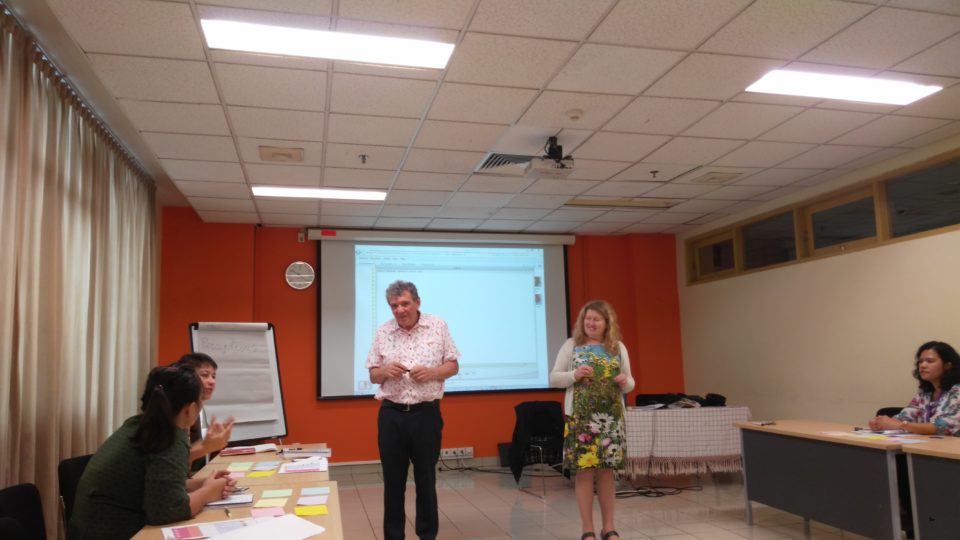One Day Seminar with Representatives from Gent University.
On 20th February 2017, two representatives from Gent University, Belgium visited Binus University to give a very informative one day seminar abut process communication model.
As a sneek peek of their one day seminar, I would like to share some knowledge that I’ve learned from the two PCM trainers, dr. Edwin Hantson and dr. Marie Claire Van de Velde.
Process communication model: one day seminar.
PCM Shows how someone prefers to communicate, what drives people, the feedback they value and their typical emergency signal.
Origins of PCM
PCM developed by Taibi Kahler based on Transactional Analysis. In TA, it is explained that there are 3 ego states. These ego states are Parent ego state, adult ego state and child ego state. The parent ego state is divided to nurturing parent ego state (tough and affection) and critical parent ego state (ethical, obey rules and regulations, pursue ideas). Adult ego state is more of one’s professional side, such as think, judge, makes decisions objectively. The last one is Child ego state which are divided to Free child ego state (act instinctively and impulsively, creative, curious and intuitive) and adapted child ego state (obedient and trusting to others).
Excluding one ego state may be problematic for oneself. PCM sees personality as a six floor apartment, that these personalities are the main fundamental that builds an individual. In PCM you can determine which personality is the strongest.
Contact Percepties
Contact percepties sees the way an individual prefers to interact towards the world and other people.
There are 3 ways of how people choose to interact.
- Heads (thoughts)
- Thoughts – Logic
- Opinions – Values
- Feelings (heart)
- Emotions – compassion
- Hands (action)
- Inaction – imagination
- Reaction – likes/dislikes (fun)
- Actions – charm
A person could have one or more layers of percepties combination. This deals with what’s being said to people and how it is being said.
Kahler Personality Types
Based on the three ways of contact percepties, Kahler defines 6 personality types. Each of these types has their own psychological needs that has to be satisfied and the perception they use the most.
The six kahler personality types are:
- Harmonizer
Is a type of person that sees importance in recognition of person and sensory. This kind of person feels first (emotion).
- Thinker
An individual with this type wants to be recognized by their work and time structure. They emphasize more on thoughts or thinking.
- Persister
An individual with this type wants to be recognized by their work and their conviction. They usually have judgments or opinions towards something first.
- Imaginer
This type of person likes solitude and enjoys being alone. They emphasize more on inaction, they like to reflect themselves over things.
- Rebel
Individuals with this type acts based on reaction, as in likes and dislikes. They emphasize more on contact with other people.
- Promoter
People with this type tend to acts first based on incidence.
Personality structure
There is no one personality type that is better or worse, smarter or less smart, more or less okay.
PCM helps people to understand themselves and other people based on the situation. PCM helps you to interact with so many kinds of people.
Strokes
In TA, there is one term which is very famous and salient. TA calls this as “strokes”. Each and every individual tend to look after strokes. It can be positive stroke or negative stroke. For example, if you do something good, you want people to give you appreciation such as a pat on your back or a simple “well done, you’ve done your job well”, this is called positive stroke. A negative stroke is something people look out when they don’t get a positive stroke. For example when you do something and your parents ignore you, you will do something that attracts their attention. Such as doing something naughty so your parents will give their attention and will give you punishment.
In other words, PCM will make you understand the psychological needs of each personality types.



Comments :